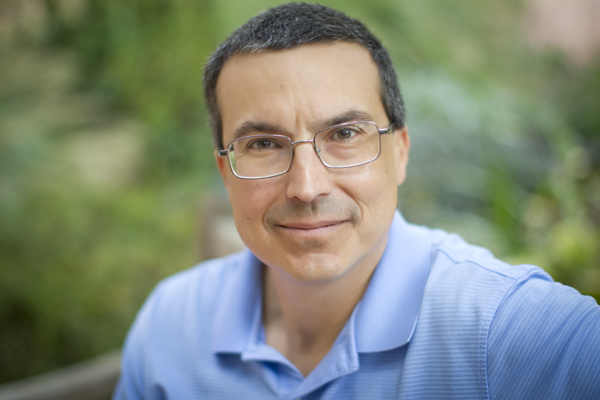
Bates in the News: May 25, 2018
Bates College
Bates College to start new science and research building in 2019 — MaineBiz
MaineBiz, the Lewiston Sun Journal, and the Portland Press Herald reported on the unveiling of the design of Bates’ new science building. The building will house programs in biology, chemistry, and neuroscience and offer state-of-the-art instrumentation and lab space.
“Scheduled for opening in 2021, the science building is a centerpiece of The Bates Campaign, a $300 million fundraising campaign publicly announced in May 2017 whose goals include both this new facility and the modernization of existing STEM structures to optimize teaching and research,” MaineBiz writes.
John Rasmussen
Bates nearing its carbon-neutral goal — Sun Journal
After its first full winter of heating the campus with a fuel oil that, because it’s created from woody plant materials, is not a source of fossil carbon emissions, Bates is on track to make the campus carbon-neutral by 2020.
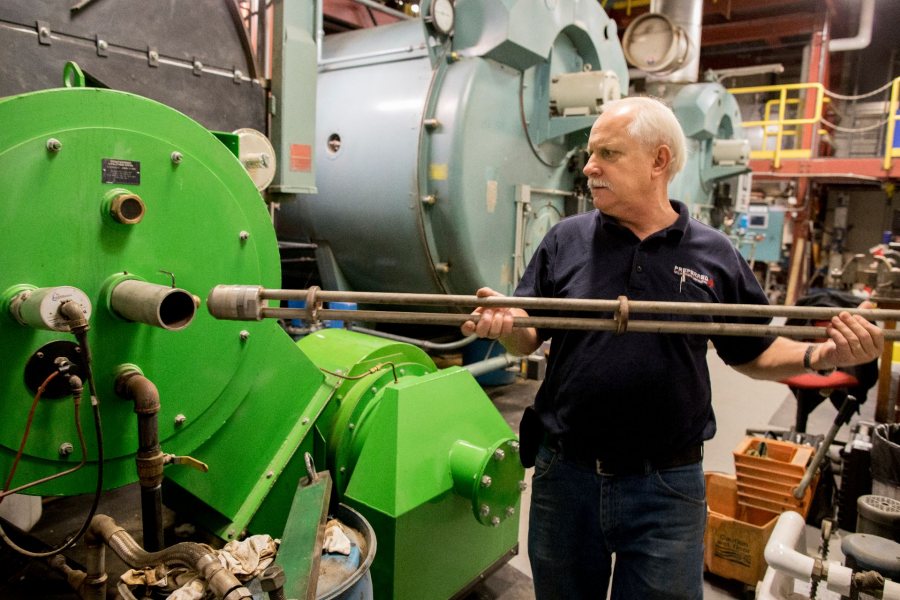
Darrel Scribner of Preferred Utilities Manufacturing Corp. starts the college’s Renewable Fuel Oil burner by inserting an ignition oil gun. Bates is the only college in the country using Renewable Fuel Oil, which drastically reduces fossil-fuel carbon emissions. (Phyllis Graber Jensen/Bates College)
The Sun Journal’s Steve Collins reviewed college sustainability efforts that are bringing that carbon neutrality goal into reach.
“This winter’s gone very well” with the so-called Renewable Fuel Oil that has become the primary energy source for Bates’ campus heating plant, energy manager John Rasmussen said.
Bates’ success in energy conservation “has received notice,” Collins wrote. “The Association for the Advancement of Sustainability in Higher Education – an international sustainability rating agency – ranked Bates in fourth place worldwide in the clean energy category for 2017.”
Jason Perkins ’97
Allagash joins the ranks of can-do brewers in Maine — Portland Press Herald
The Portland Press Herald interviewed Jason Perkins ’97, whose Allagash Brewing Company is at the tail end of a sea change in Maine beer: Most of the state’s largest breweries have ditched bottles and put at least some of their beer in cans.
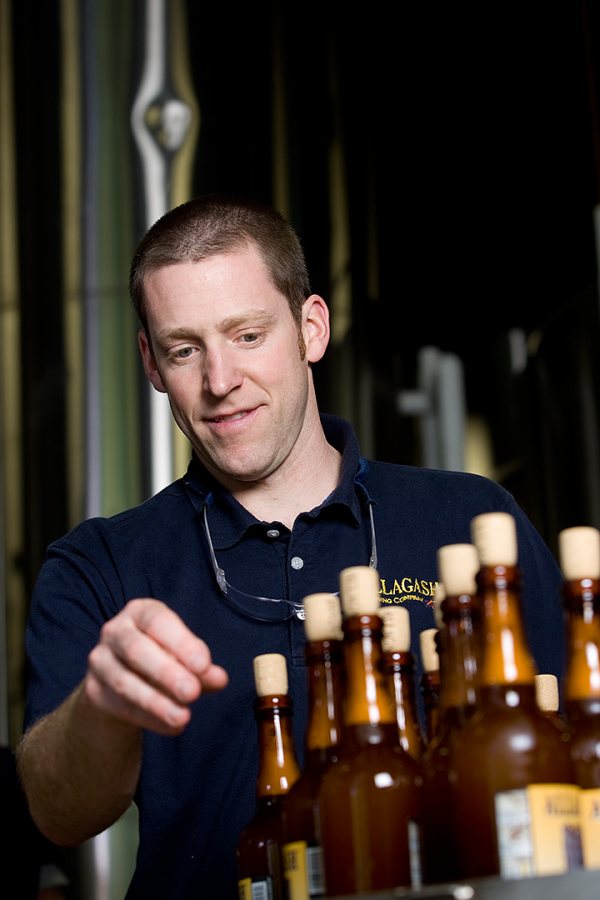
Jason Perkins ’97 of Allagash Brewing Company, photographed in 2008 at the brewery’s headquarters in Portland, Maine. (Phyllis Graber Jensen/Bates College).
Allagash made the switch in April, but it’s starting small, canning only one type of beer and selling it only at the Portland brewery itself. Cans are more portable, and the beer inside them less susceptible to damaging ultraviolet light.
“We really view this as doing things in a methodical, slow way, the way we’ve always done things here,” Perkins told reporter James Patrick, adding that Allagash might one day can its biggest seller, White. “It allows us to make sure we learn the trade before we take any further step forward.”
Ben Shaw ’00
Vets First Choice to become Maine’s newest public company — Portland Press Herald
The Portland Press Herald reported that Vets First Choice, a veterinary technology provider headed by Ben Shaw ’00, will become the fourth publicly traded company in Maine that isn’t a bank.
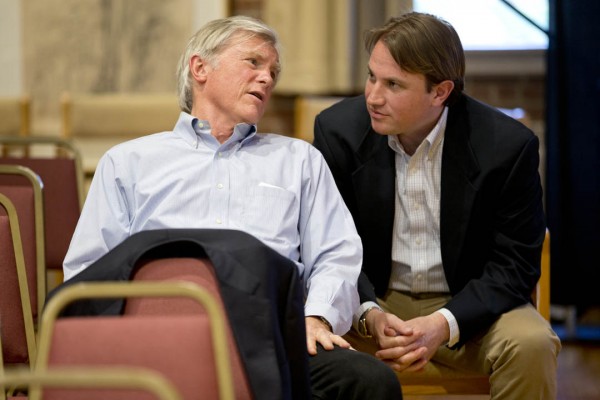
Ben Shaw ’00, founder and CEO of Vets First Choice, talks with his father, IDEXX founder and Bates honorary degree recipient David Shaw. (Phyllis Graber Jensen/Bates College)
The Portland-based company, which gives local veterinarians a leg up by outsourcing online pharmacy services, will merge with the spun-off animal services division of Henry Schein, Inc.
The Press Herald’s J. Craig Anderson reports that Vets First Choice employs 800 people and serves 20,000 veterinary practices, and it recently received $223 million in venture capital investments.
“Building upon our long history of reinvention, the company will continue to expand our offering of innovative solutions for our dental and medical customers,” Shaw said. “We see significant growth opportunities.”
Nima Olumi ’17
Squash Without the Ceiling — The New York Times
Nima Olumi ’17 ran into The New York Times’ Amy Sohn as she was reporting on the opening of a public outdoor squash court in Manhattan, a rarity for a sport that’s usually played indoors and that has a reputation as a game for the elite.
Turns out Olumi, who’s volunteered with SquashBusters in Boston, and the creators of this pop-up squash spot were on the same page: They try to increase access to the sport.
Olumi, Sohn writes, decided to play shirtless in the warm afternoon. “The sight of a shirtless squash player on an outdoor court, a stone’s throw from the East River, seemed to encapsulate New York’s past and future at once.”
Carolyn Court
A-L Hall of Fame: Court inducted after almost four decades of coaching — Sun Journal
The Lewiston Sun Journal profiled retired women’s track and country coach Carolyn Court, who was inducted into the Auburn-Lewiston Sports Hall of Fame in May.
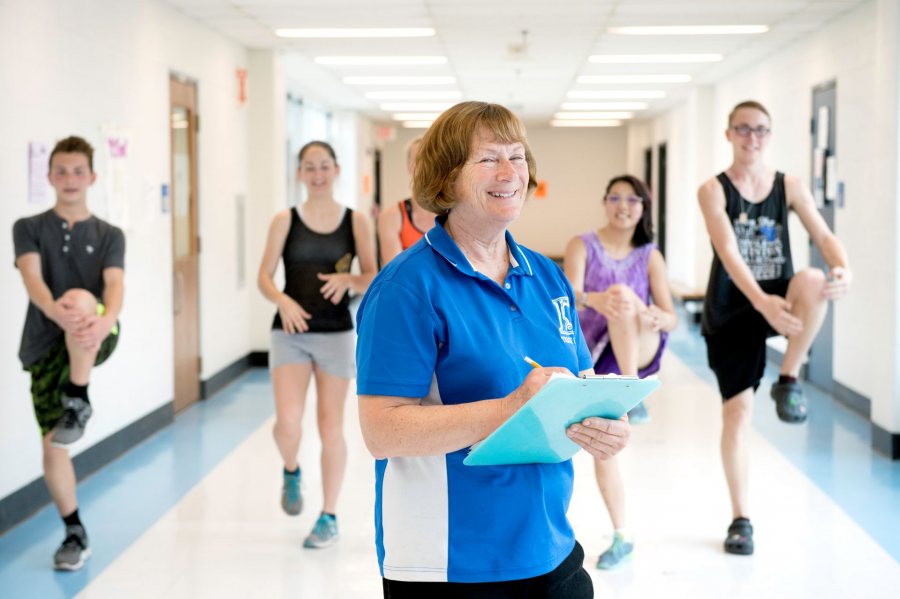
Lewiston High School track coach and retired Bates track and cross country coach Carolyn Court was inducted into the Auburn Lewiston Sports Hall of Fame. (Daryn Slover/Sun Journal)
Court coached track and cross country at Bates from 1979 to 2004, winning the 1995 cross country Coach of the Year in New England Division III in 1995 and coaching 15 All-American award winners.
Since her retirement, she’s been the assistant track and field coach at Lewiston High School. “She never stops,” head coach Paul Soracco told the Sun Journal. “She’ll be texting me at 3 in the morning about the meet the next day, and I’m like, ‘What are you doing, go to bed.’ I am excited for her to be inducted. I don’t know why it hadn’t happened sooner.”
Matt Moretti ’06
These machines from Japan could put scallop farming in Maine on the map — Bangor Daily News
The Bangor Daily News talked to Matt Moretti ’06 of Bangs Island Mussels, which is testing new machinery that could make Maine home to the “first semi-automated commercial scallop aquaculture operations outside Japan.”
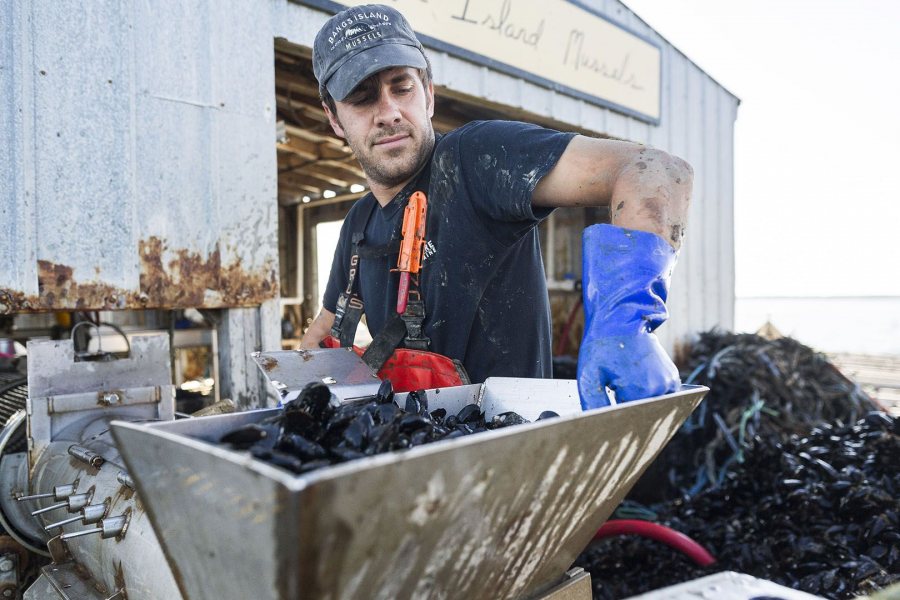
In 2016, Matt Moretti ’06 begins to feed mussels into a machine that works to break apart the Bissell tissue connecting many of the clusters. His company, Bangs Island Mussels, is testing out machinery that will automate part of the scallop-farming process. (Josh Kuckens/Bates College)
The machines, funded by a grant, speed up the process of growing scallops on ropes off the Maine coast, something Moretti has been doing with mussels since 2010. Automation could, Moretti says, ensure that scallop farmers can consistently feed a growing market.
“We’re super excited about this project,” he says. “It could be a huge boost to the Maine economy.”
Eben Sypitkowski ’05
Let there be dark: Advocates push Maine as astrotourism destination — Maine Sunday Telegram
Maine has exceptionally dark skies — it contains the largest area without light pollution in the eastern U.S. A group of advocates is trying to keep it that way with a formal “dark sky” designation that would help bring visitors here to marvel at the stars.
The Maine Sunday Telegram interviewed Eben Sypitkowski ’05, the resource manager for one of the darkest places in the state, Baxter State Park. Baxter’s original mission of protecting the park’s natural resources “nicely aligns with minimizing human impacts like light pollution,” writes Mary Pols.
But Baxter isn’t looking for a designation from the International Dark-Sky Association, as many Maine advocates want. “We have these commitments to the deeds of trust and that is where our priorities lie,” Sypitkowski said. “Anything that may conflict with it or interfere with it is not something we would want to get involved with.”

